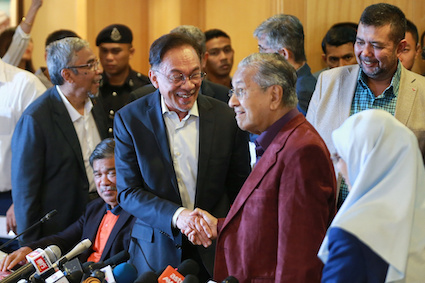
Dennis Ignatius
To mark the second anniversary of that seminal event in Malaysian history – the May 9th elections that brought Pakatan Harapan (PH) to power – Dr Mahathir Mohamad and Anwar Ibrahim issued a rare joint statement recalling that momentous night and urging Malaysians “to rise again and return the people’s mandate to the rightful party.”
“Never forget,” they intoned, “the sacred date of May 9, 2018. It was the date when kleptocracy fell. It was the date of the people’s victory. It was the birth of Malaysia Baru.”
If they are hoping that such an insipid and fatuous statement – a statement that even Mat Sabu and Lim Guan Eng couldn’t apparently be persuaded to join – will galvanize public support for them, they are simply delusional.
In the first place, the people need no reminders; it’s the politicians – Mahathir and Anwar in particular – who need to reflect long and hard on what brought us to this forlorn moment in time. Who, after all, lost Malaysia Baru?
It is worth remembering that after GE14, Mahathir had everything going for him and the government he led – a clear majority in parliament, a convincing and widely supported agenda for reform, talented and dedicated parliamentarians and a strong popular mandate. Malaysians, by and large, wanted him to succeed and cheered him on at every turn. Perhaps no other government had as much going for it as the PH government post GE14.
PH, however, proved incapable of working together to advance the people’s agenda. And for that, Mahathir must shoulder much of the blame. Right from the beginning, he sought to manipulate parties and personalities in pursuit of his own ambitions. He walked back on manifesto promises; he flirted with UMNO and PAS; he indulged his enormous appetite for race-based politics.
As well, he went out of his way to undermine his designated successor by pitting Azmin Ali against him and stoking doubts about his ability and suitability for the job at every turn. To say that he and his party were never fully committed to PH would be an understatement.
In the end, PH collapsed not because of external pressures; it was brought down by intrigues from within. It is no secret that Mahathir himself was getting ready to ditch PH in favour of an all Malay government in order to stymie Anwar and rein in the DAP. And he would have succeeded if not for the treachery of those closest to him – Muhyiddin and Azmin.
As he played his games, did he ever think about the people who trusted him and worked so hard to elect him? Did he think about all the people who overcame their own misgivings and embraced him despite all the damage he had inflicted upon the nation in his first term? It’s all too rich, too convenient for him to now appeal for the support of the people; after this, few will ever trust him again.
Besides, what can we expect from Mahathir should he return to Putrajaya at the head of a patched-up Pakatan Harapan coalition? Is he going to endorse Anwar? Are both of them going to work together as a team or will the sparring between the two of them once again overshadow everything else?
Will he go all out to honour Pakatan’s manifesto promises or will he continue to make excuses? Will he truly fight corruption wherever it may be found – even within his own camp – or will his anti-corruption campaign continue to be limited only to his immediate political adversaries? Will he work to build “Bangsa Malaysia” or will he instigate and encourage the Ketuanan Melayu crowd once more?
And what about all those PPBM and PKR turncoats? Is everyone going to kiss and make up and return to being one big unhappy family again? Are we expected to forget their treachery and welcome them back into the PH fold as if nothing has happened?
Anwar too doesn’t come out of all this with his credibility intact either. Since returning to parliament as head of PKR, what has he accomplished? His strategy – lie low and wait for the durian to fall – is hardly an inspiring one.
He has rarely ventured out into the Malay heartland to make his case and neither has he emerged as the forceful voice of reformasi that many thought he would be. Worse still, he appears to have been unwilling to make the tough choices that leadership demands, refusing for months to call out Azmin and the other renegades in PKR for their treacherous behaviour.
Even now, after all Mahathir has done to discredit him and side line the reformasi movement, despite the fact that Mahathir still refuses to endorse him, Anwar is willing to glibly issue a joint statement with Mahathir. Was he hoping that no one would notice that there’s no love lost between them or that they are still miles apart politically? Perhaps Mahathir was right about him after all.
Whatever it is, there’s no escaping the reality that PH is irretrievably broken. The damage is done; there’s no going back to the halcyon days immediately following GE14. Trying to revive Pakatan is simply a fool’s errand, more about salvaging the tattered political careers of a few ambitious men than about restoring Malaysia Baru.
It should be clear by now that the current crop of leaders (on both sides of the aisle) have proven themselves unworthy of our trust and of our vote. Their time is past; we can no longer look to them to bring us to the promised land of Malaysia Baru. The struggle for reform must now await younger, more principled leaders without the baggage of the past, and who are genuinely committed to building a united, democratic and just nation.



No comments:
Post a Comment
Note: Only a member of this blog may post a comment.